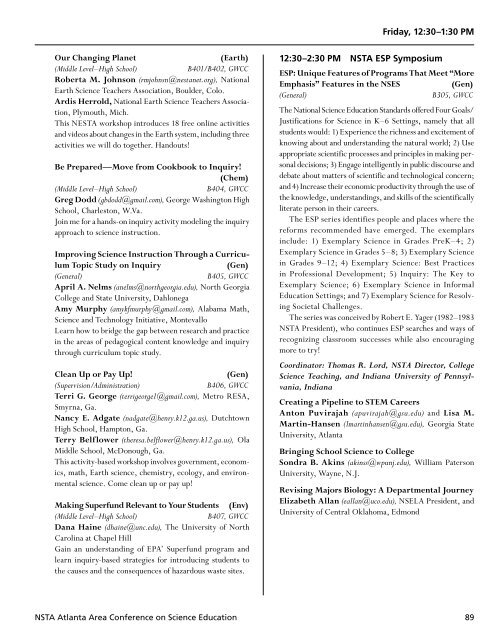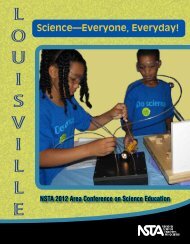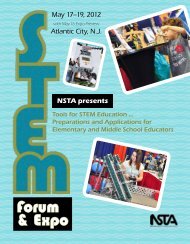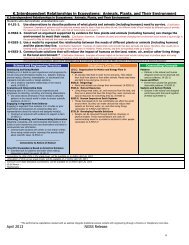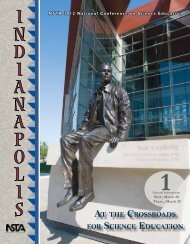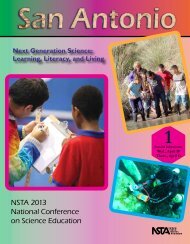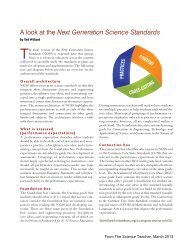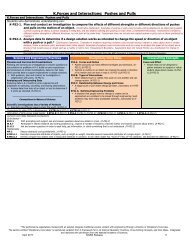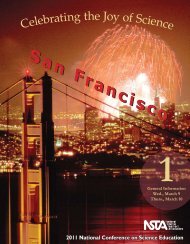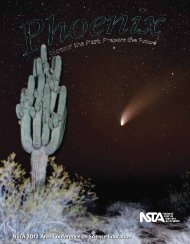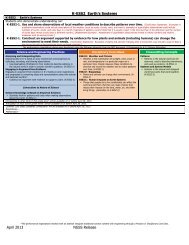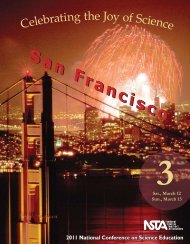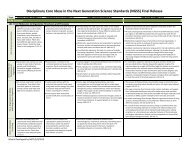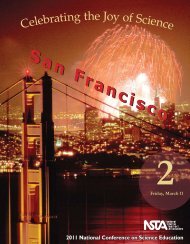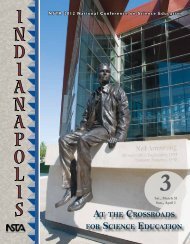Atlanta Conference Program
Atlanta Conference Program
Atlanta Conference Program
Create successful ePaper yourself
Turn your PDF publications into a flip-book with our unique Google optimized e-Paper software.
Friday, 12:30–1:30 PM<br />
Our Changing Planet<br />
(Earth)<br />
(Middle Level–High School)<br />
B401/B402, GWCC<br />
Roberta M. Johnson (rmjohnsn@nestanet.org), National<br />
Earth Science Teachers Association, Boulder, Colo.<br />
Ardis Herrold, National Earth Science Teachers Association,<br />
Plymouth, Mich.<br />
This NESTA workshop introduces 18 free online activities<br />
and videos about changes in the Earth system, including three<br />
activities we will do together. Handouts!<br />
Be Prepared—Move from Cookbook to Inquiry!<br />
(Chem)<br />
(Middle Level–High School)<br />
B404, GWCC<br />
Greg Dodd (gbdodd@gmail.com), George Washington High<br />
School, Charleston, W.Va.<br />
Join me for a hands-on inquiry activity modeling the inquiry<br />
approach to science instruction.<br />
Improving Science Instruction Through a Curriculum<br />
Topic Study on Inquiry<br />
(Gen)<br />
(General)<br />
B405, GWCC<br />
April A. Nelms (anelms@northgeorgia.edu), North Georgia<br />
College and State University, Dahlonega<br />
Amy Murphy (amykfmurphy@gmail.com), Alabama Math,<br />
Science and Technology Initiative, Montevallo<br />
Learn how to bridge the gap between research and practice<br />
in the areas of pedagogical content knowledge and inquiry<br />
through curriculum topic study.<br />
Clean Up or Pay Up!<br />
(Gen)<br />
(Supervision/Administration)<br />
B406, GWCC<br />
Terri G. George (terrigeorge1@gmail.com), Metro RESA,<br />
Smyrna, Ga.<br />
Nancy E. Adgate (nadgate@henry.k12.ga.us), Dutchtown<br />
High School, Hampton, Ga.<br />
Terry Belflower (theresa.belflower@henry.k12.ga.us), Ola<br />
Middle School, McDonough, Ga.<br />
This activity-based workshop involves government, economics,<br />
math, Earth science, chemistry, ecology, and environmental<br />
science. Come clean up or pay up!<br />
Making Superfund Relevant to Your Students (Env)<br />
(Middle Level–High School)<br />
B407, GWCC<br />
Dana Haine (dhaine@unc.edu), The University of North<br />
Carolina at Chapel Hill<br />
Gain an understanding of EPA’ Superfund program and<br />
learn inquiry-based strategies for introducing students to<br />
the causes and the consequences of hazardous waste sites.<br />
12:30–2:30 PM NSTA ESP Symposium<br />
ESP: Unique Features of <strong>Program</strong>s That Meet “More<br />
Emphasis” Features in the NSES<br />
(Gen)<br />
(General)<br />
B305, GWCC<br />
The National Science Education Standards offered Four Goals/<br />
Justifications for Science in K–6 Settings, namely that all<br />
students would: 1) Experience the richness and excitement of<br />
knowing about and understanding the natural world; 2) Use<br />
appropriate scientific processes and principles in making personal<br />
decisions; 3) Engage intelligently in public discourse and<br />
debate about matters of scientific and technological concern;<br />
and 4) Increase their economic productivity through the use of<br />
the knowledge, understandings, and skills of the scientifically<br />
literate person in their careers.<br />
The ESP series identifies people and places where the<br />
reforms recommended have emerged. The exemplars<br />
include: 1) Exemplary Science in Grades PreK–4; 2)<br />
Exemplary Science in Grades 5–8; 3) Exemplary Science<br />
in Grades 9–12; 4) Exemplary Science: Best Practices<br />
in Professional Development; 5) Inquiry: The Key to<br />
Exemplary Science; 6) Exemplary Science in Informal<br />
Education Settings; and 7) Exemplary Science for Resolving<br />
Societal Challenges.<br />
The series was conceived by Robert E. Yager (1982–1983<br />
NSTA President), who continues ESP searches and ways of<br />
recognizing classroom successes while also encouraging<br />
more to try!<br />
Coordinator: Thomas R. Lord, NSTA Director, College<br />
Science Teaching, and Indiana University of Pennsylvania,<br />
Indiana<br />
Creating a Pipeline to STEM Careers<br />
Anton Puvirajah (apuvirajah@gsu.edu) and Lisa M.<br />
Martin-Hansen (lmartinhansen@gsu.edu), Georgia State<br />
University, <strong>Atlanta</strong><br />
Bringing School Science to College<br />
Sondra B. Akins (akinss@wpunj.edu), William Paterson<br />
University, Wayne, N.J.<br />
Revising Majors Biology: A Departmental Journey<br />
Elizabeth Allan (eallan@uco.edu), NSELA President, and<br />
University of Central Oklahoma, Edmond<br />
NSTA <strong>Atlanta</strong> Area <strong>Conference</strong> on Science Education<br />
89


